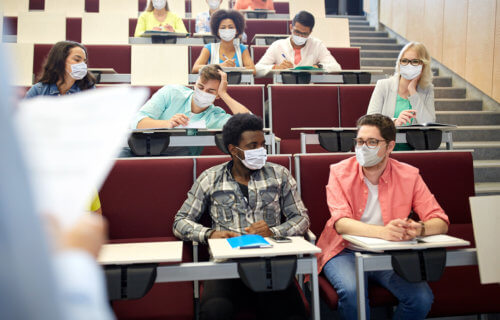COLUMBUS, Ohio — The COVID-19 pandemic may be behind us, but many college students are now second guessing themselves because of it, according to researchers from The Ohio State University. Their study found that students enrolled in the fall 2020 semester displayed less consistent decision-making skills in comparison to others who participated in similar research in previous years.
These findings suggest the decision-making capabilities of college students (including some graduating in 2023) were negatively affected by the coronavirus pandemic. To reach these conclusions, the research team analyzed and compared responses to a proposed hypothetical situation made by students during the pandemic to responses made by other students during earlier studies.
This led to the discovery of evidence indicating students in 2020 were more likely to cycle between going with their gut and more thoroughly “mulling over” their responses, depending on how the scenario had been described.
“Our theory is that feeling stressed by everything going on was limiting students’ resources to really evaluate the information that was presented to them,” says lead author Melissa Buelow, professor of psychology at Ohio State’s Newark campus, in a university release.
Indecision may be a sign of the ‘pandemic brain’
The study also suggests that the prolonged and wide-ranging uncertainties of the pandemic and global lockdowns, a unique situation incapable of being reproduced in a lab, affected the brain region responsible for problem solving and decision making.
“I think that is one of the more important findings – that the stresses of everyday life can wax and wane, and they can potentially overwhelm your cognitive resources and you can see real downstream effects on everyday activities that require your energy and your effort,” Prof. Buelow adds. “This study provides additional information to understand why students may have been having difficulty coming to class, focusing on class and getting things turned in – because there was this global event affecting every part of their lives.”
During the fall semester 2020, on-campus Ohio State students attended classes offered virtually and in-person with reduced density and continued physical distancing, masks requirements, and routine COVID testing. Researchers presumed that these students were free of COVID-19 infection at the time they took part in this study. Prof. Buelow and her colleagues were inspired to perform this research after referring to their own foggy thinking as “pandemic brain” during a casual conversation.
“We said if we are experiencing this, we wonder if others were as well,” Prof. Buelow explains. “And as we were collecting data, we heard in the popular press about this idea of the stress of COVID leading to difficulty with thinking, processing information and making decisions.”

Students start answering questions based on how they’re framed
A clinical neuropsychologist, Buelow has used the Adult Decision Making Competence (ADMC) scale in her work for a decade. The tool presents numerous scenarios, framed in both positive and negative ways, and then asks users to respond with their personal, preferred solution or recommendation.
Study authors compared a pre-pandemic dataset encompassing 722 undergraduates who had been assessed with the ADMC scale to pandemic data pertaining to 161 students who participated in one of two assessments during the 2020 fall semester. Ultimately, researchers say their main finding was that instead of recognizing that ethics-based scenarios resulted in the same outcome whether presented as a gain or loss, students in 2020 were more likely to answer differently based on the framing of the information.
“Reliance on whether ‘this is a win’ versus ‘this is a loss’ really factored into decision making,” Prof. Buelow notes.
Despite this inconsistency, researchers note that students in 2020 were as confident as their pre-pandemic counterparts that their decisions on accuracy-based questions were correct.
“That struck us as interesting, with potential implications for the health and well-being of individuals adequately perceiving risk,” Prof. Buelow says. “Are individuals aware of what they do and don’t know, so to speak? And if you aren’t, does that lead to more risk?”
Dropping COVID safety policies didn’t help
Next, the team assessed another 72 students two times during the spring 2022 semester in order to gauge whether COVID vaccinations and loosened mask and distancing requirements lowered the pandemic’s impact on decision making. This exploratory analysis with a smaller sample found that students were still making less consistent decisions in comparison to pre-pandemic students. Moving forward, Prof. Buelow and colleagues continue to collect data and will track changes in student decision making over an even longer period of time.
“Situational factors can affect why people make a good, advantageous decision versus a bad or risky decision, and that is important context to have,” she concludes. “When we acutely stress individuals in the lab, we see a subsequent lowering of decision-making consistency. These findings really fit in with that – so we can theorize, in the absence of an acute lab stressor, that it was COVID, a much more global factor affecting every aspect of our lives, that affected cognition.”
The study is published in the Journal of American College Health.
You might also be interested in:
- Plotting primates: Monkeys are capable of complex thinking, making careful decisions
- Is consciousness an illusion? New theory claims the unconscious brain makes all decisions
- Like fingerprints, our decisions make us more unique individuals

